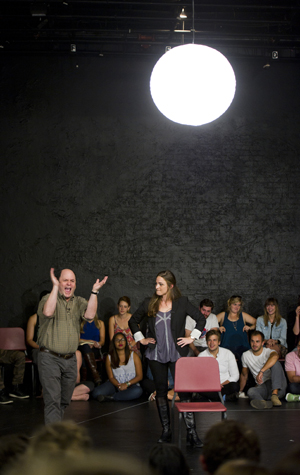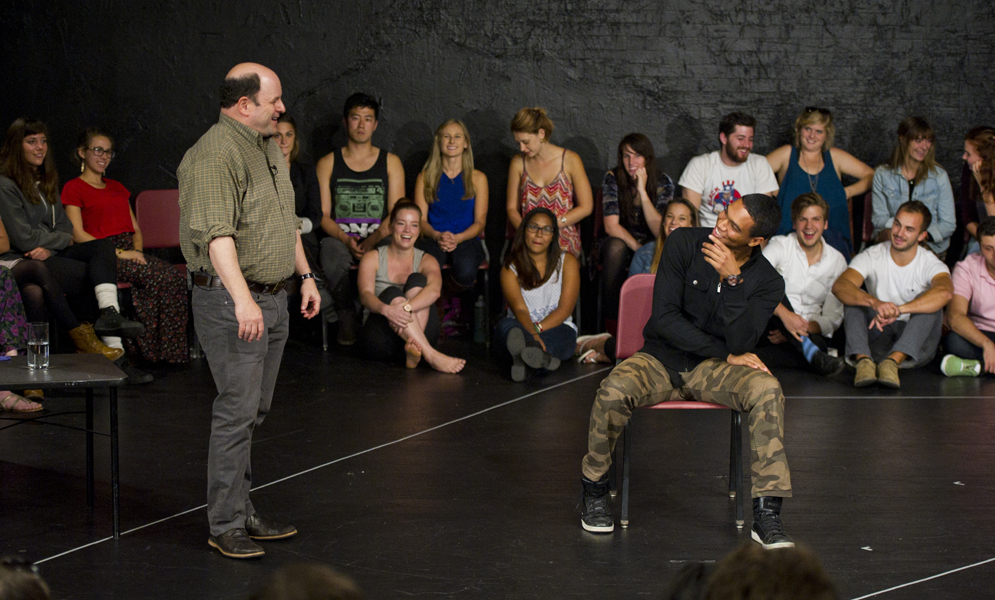Seinfeld’s Costanza Gives Master Class in Acting at CFA
Jason Alexander returns to work with School of Theatre students
Long before he became famous for playing curmudgeon George Costanza on the long-running hit TV series Seinfeld, actor Jason Alexander was making a name for himself on Broadway. He starred in Stephen Sondheim’s Merrily We Roll Along and Neil Simon’s Broadway Bound before winning a Tony Award for his performance in Jerome Robbins’ Broadway in 1989. Alexander (CFA’81, Hon.’95) drew on these experiences during a recent master class he conducted before more than 100 School of Theatre students.
In addition to his gig on Seinfeld, he has appeared in dozens of films and television shows over his three-decade-long career, including Pretty Woman, Shallow Hal, and Curb Your Enthusiasm. In his current gig he is lending his voice to the documentary The Gettysburg Address. His performance in Seinfeld, which ran for nine seasons, from 1989 to 1998, earned seven Emmy nominations and four Screen Actors Guild awards.
On September 22, Alexander, back on campus to teach a master class to School of Theatre students, was introduced to the crowd packing CFA’s Theatre Lab by Benjamin Juárez, dean of the College of Fine Arts. Seniors were invited to sit on the stage, while underclassmen filled the seats. “I guess some people don’t need introductions,” Juarez said. “He was one of you . . .”—“a Terrier,” Alexander quipped, “never went to a single sporting event.”
Dressed casually in jeans and a button-down shirt, the actor recounted how the late Jim Spruill (CFA’75), then a CFA associate professor of theater arts, gave him some indispensable career advice. “Jim called me in his office late sophomore year. I wanted to be a classical actor. He said, ‘I know your heart and soul are Hamlet. But you will never play Hamlet.’” He was referring to Alexander’s physicality and appearance. Instead, Alexander said, Spruill urged him, “‘Learn to do comedy and love it.’ He was right.” The actor left BU a year shy of graduating to appear in a film shooting in New York City. Months later he was on Broadway starring in Merrily We Roll Along.

Alexander told the students that later he studied under famed acting coach Larry Moss, and he listed four rules of acting he learned from Moss. All actors must do their homework when given a role and ask themselves the following questions as they develop their character:
- Who am I talking to?
- What do I want them to do?
- What do I do to make them do that?
- What’s in the way of me getting what I want?
He returned to those rules throughout the evening while he worked with CFA seniors Maria Timonina (CFA’15), Kaylyn Bancroft (CFA’15), and Harrison Grant Meacham (CFA’15). Each performed a short monologue on stage while Alexander took notes. He then gave them the notes and asked them to try the monologue again.
“You have to be talking to someone,” he instructed Timonina after her monologue from the Tony-nominated play Well. He jumped onto the stage when she finished and told her that she needed to hone her focus. She performed the monologue several times, each time including, at Alexander’s urging, different nuances in tone, delivery, and movement. After Timonina’s last reading, Alexander stopped her and asked the crowd, “Do you feel a purpose, a difference that makes you want to hear the next line?”
“Yes!” they yelled.
“This is very heady, and technical,” said Alexander, referring to the master class. “You probably didn’t sign up for this crap.”
When Bancroft came up on stage to perform a piece from The Little Dog Laughed, another Tony-nominated play, Alexander, whose advice was often obscenity-laden and even more often funny, challenged her to imagine a person sitting across from her as she did her monologue. “You have to see him and react to him!” Alexander told her.
“The idea of a person who I grew up watching on television actually talking to me—I was honestly afraid that my brain would not be able to compute,” said Bancroft after the event. “But his way of applying techniques to the work was really unlike anything I have really explored, and I found it incredibly useful.”
Meacham climbed on stage to deliver a monologue from Katori Hall’s play The Mountaintop, about the night before the assassination of Martin Luther King Jr. (GRS’55, Hon.’59). “You have enormous grace and stage presence,” Alexander told the young actor.

Alexander poses questions to Harrison Grant Meacham (CFA’15) during the latter’s scenes.
Following the master class, Alexander stuck around for audience questions, many focused on the differences between acting for stage and acting for film. “Film directors tell you to bring it down in a performance,” Alexander said. “Think of all Oscar-winning performances. Were any of them small?” By way of example, he recounted the time he and Michael Chiklis (CFA’85) both auditioned for the role of John Belushi in the film Wired. Although they were neck and neck for the part, Chiklis went for a bigger impact, and trashed the set during the audition. Alexander laughed: “He got the part.”
A few references to Seinfeld inevitably popped up during the Q&A. At one point, Alexander described himself as a lucky guy “who stepped in a puddle called Seinfeld. Changed my life.” The actor, who serves on the CFA Dean’s Advisory Board, said that he has two college-age sons, who “combined have probably seen a total of seven Seinfeld episodes.”
But it was the heartfelt advice and encouragement Alexander offered to the students that made the evening especially memorable. At one point, he told students that they have no reason to not do what they want to do, noting that iPhones and YouTube have made it easier than ever to produce a film. “Be gentle with yourself,” Alexander counseled. “You don’t yell at a bud because it’s not a flower yet. It’s going to take time.”

Comments & Discussion
Boston University moderates comments to facilitate an informed, substantive, civil conversation. Abusive, profane, self-promotional, misleading, incoherent or off-topic comments will be rejected. Moderators are staffed during regular business hours (EST) and can only accept comments written in English. Statistics or facts must include a citation or a link to the citation.